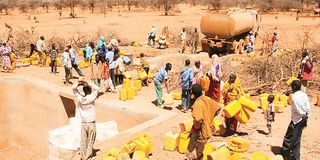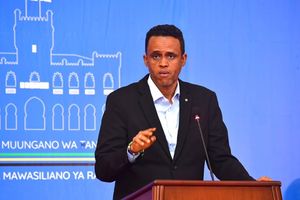Five universities join forces to fight impact of climate change

What you need to know:
- As part of efforts to address the climate crisis, five leading academic institutions have come together to form the first-ever university consortium in Tanzania focused on tackling climate change
Dar es Salaam. In efforts to address the climate crisis, five leading academic institutions have come together to form the first-ever university consortium in Tanzania focused on tackling climate change.
The collaboration, signed on Tuesday, at the University of Dar es Salaam (UDSM), marks a milestone in the country’s academic and environmental landscape.
The newly established ‘Five-University Consortium on Climate’ aims to find local solutions to the growing challenges of water, health, and environmental sustainability.
The five institutions: Simon Fraser University (SFU) from Canada, Aga Khan University (AKU), Nelson Mandela African Institute of Science and Technology (NM-AIST), Sokoine University of Agriculture (SUA), and UDSM—are ready to fundraise for the mission.
The consortium’s launch was celebrated at a conference themed; Water, Health, and Data Analytics in a Changing Climate, attended by experts from around the world.
This partnership comes at a critical moment when the Tanzanian government has pledged to reduce carbon emissions by 2035, as stated by President Samia Suluhu Hassan at COP28 in Egypt.
With climate change posing an existential threat to both Tanzania’s environment and its people, the need for collaborative research and innovation is more urgent than ever.
“This consortium is not just a partnership between universities; it is a response to an existential threat we cannot afford to ignore,” said UDSM Vice Chancellor, Prof William Anangisye in an interview.
“Through this initiative, we aim to generate knowledge, share expertise, and create sustainable solutions for the climate challenges that affect all Tanzanians, particularly in rural areas.”
Unlike previous collaborations between Tanzanian universities and foreign institutions, which often catered to external research agendas, this new consortium focuses on ‘local solutions for local problems’.
Climate change impacts such as water scarcity, health challenges, and agricultural disruptions are affecting Tanzanians daily.
With a population growing at an exponential rate, it’s clear that local knowledge, solutions, and innovations must take centre stage in the fight against climate change.
Vice Chancellor of AKU, Dr Sulaiman Shahabuddin, emphasised the importance of the consortium’s focus on local solutions.
“By combining our resources and expertise with local universities, we can co-create solutions that will directly benefit Tanzanians,” he said.
“This collaboration represents a paradigm shift—one where academic institutions and research centres work hand-in-hand with communities to tackle the real-world problems they face.”
The inclusion of institutions like SUA is especially significant. With the country’s agricultural sector being one of the most vulnerable to climate change, the university is committed to finding ways to help farmers adapt to shifting weather patterns.
Deputy Vice Chancellor for Academic Affairs at SUA, Prof Maulid Mwatawala, believes that universities have an obligation to provide solutions that can be directly applied in the field.
“We must work to protect farmers from the impacts of climate change, which threatens their livelihoods and food security,” said Prof Mwatawala.
By pooling academic, scientific, and technical expertise, the consortium aims to offer practical solutions that address the root causes of climate-related challenges. The shared goal is not just to study the issues but to develop actionable solutions that can transform lives.
Education experts in Tanzania are encouraging other local universities to join the initiative. An expert in climate and education, Dr Sarah Mkumbwa, sees this as a model for future academic collaboration in the country.
“For years, Tanzania has collaborated with international partners, but this new consortium flips the narrative. It is about us working together to find solutions that serve us, not just those with external funding,” she said.
She added; “This consortium creates pathways for Tanzanian students to engage in research that is aligned with national priorities. This is a win for education and a win for the environment.”
As this collaboration takes off, the universities will co-sponsor symposia, seminars, and annual conferences, providing a global platform for experts to exchange ideas, share innovations, and develop collaborative projects.
Consortiums like this one have achieved remarkable success globally. One notable example is the University Climate Change Coalition (UC3), a network of 16 universities across North America working together to accelerate climate solutions.
Through research collaborations, student programmes, and policy advocacy, the UC3 has become a leader in addressing climate change through academia.
By following similar models, Tanzania’s consortium has the potential to make lasting impacts on climate research and community resilience.
The Five-University Consortium on Climate will be governed by a joint institutional steering committee, which will meet annually to review progress and explore new opportunities for collaboration.





